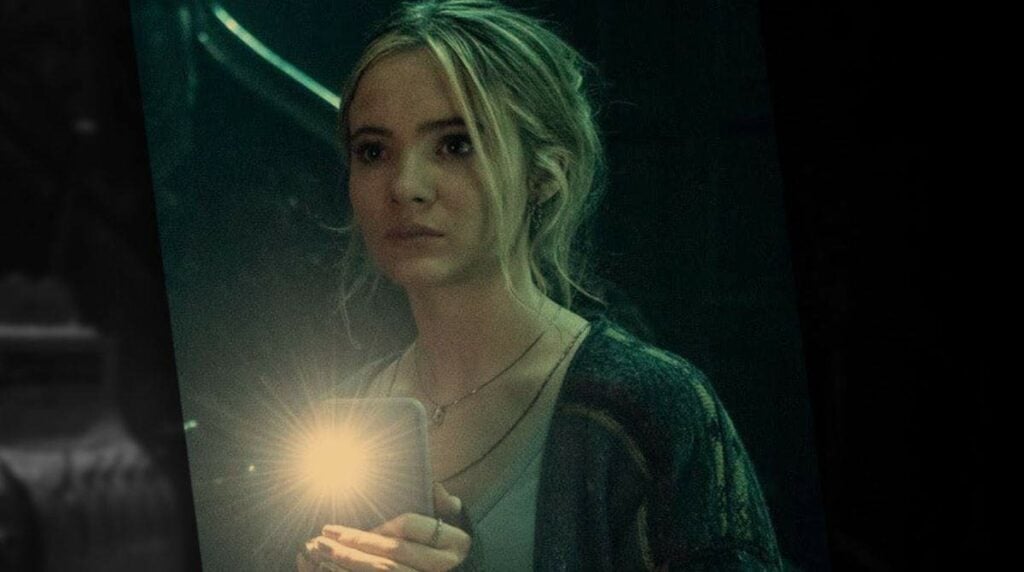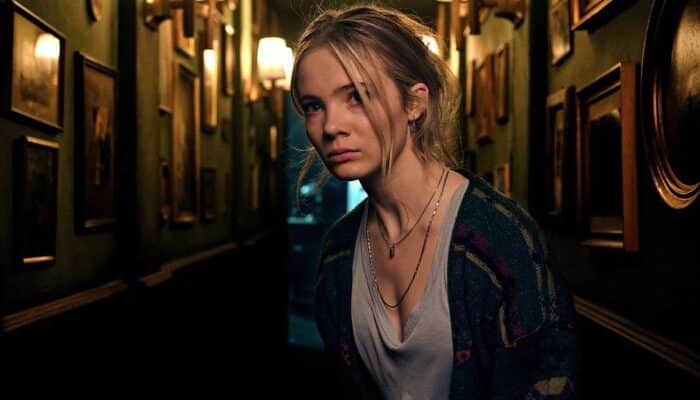
In a dusty pub, an evidently already troubled man (Peter Mullan) is disturbed by the arrival of a stranger, who enigmatically requests an audience with ‘her’. A short conversation ensues and the younger man, Neil (Jeremy Irvine) is sent away, agitated, in evident grief. It seems that this situation, and even living in this place, is coming to a head: Owen is next seen leaving a video message for the next owner of the pub, in which he describes a particular kind of sitting tenant. Whoever ends up with the pub takes the tenant: this is a warning. The ‘tenant’ has to be contained, or else only the worst can ensue. Okay, so the start of Baghead (2023) feels reminiscent of other supernatural horror tales – hints of curses with conditions attached – but scathingly critical reviews of this film seem to be missing the mark, or else they’re judging this film as lesser somehow because they happen to have seen it after they’ve seen Talk To Me (2022), a film which came out some years after the short film upon which Baghead is based; the tremendous reach which has been enjoyed by Talk To Me is hardly the fault of the team behind Baghead, even if we accept that Talk To Me is a very good horror story in its own right. But so is Baghead: some minor issues aside, this film’s deft pace and its array of intriguing ideas are genuinely worthwhile, and if there are a couple of plot puzzlers here and there, then so be it – these hardly derail Baghead‘s very strong elements, either cinematically or thematically.
The video message recorded by Owen turns out to be his last deed, and his attempts to escape The Queen’s Head – actually located in Berlin, which is curious – come to a grisly nothing. So his property now falls to his estranged daughter Iris (The Witcher‘s Freya Allan), his closest relative. Iris – and this is significant – is between jobs, places to live and programmes of study; we first meet her clambering into her old flat to retrieve a few bags of personal possessions before heading off with her friend Katie (Ruby Barker) to – who knows? Ivy is a rootless figure, so the mysterious call she takes informing her that her father is dead and she’s needed in Berlin to settle his affairs comes at a good time for her. She borrows the air fare and heads straight there, seeming perplexed, but not displeased to discover that she’s now a property owner. The mysterious Solicitor (Ned Dennehy) gets her to sign on the dotted line and that’s that (but of course, that isn’t that). Short on accommodation options, she immediately decides to stay the night.
It’s not long before Iris encounters her first scare at the pub, but it’s of mortal origin, at least at first: Neil is back, still seeking an audience with the mysterious ‘her’ who resides in the basement, and he obligingly fills Iris in with what he knows. There’s a creature, a woman, in the basement who can allow the dead to speak via her: her face is concealed, but once she is given an item which belonged to the dead, she can manifest as them – but for two minutes only. Any longer that that, and this malign entity will begin to manipulate the sitter, clawing out troubling truths about old relationships and using them to gain power over the situation. This undead witch’s ultimate aim is to gain mastery, but so long as the rules are followed, then the property owner can control her. Neil wants to speak to his deceased wife; he will give anything, but initially a large sum of money, to be allowed to do it.
‘As long as the rules are followed’; ha! I don’t think the rules are ever followed in Baghead, but let’s give credit where credit’s due. This is a genuinely effective idea, and the very first basement scene packs a punch – it’s creepy, it still feels novel and there’s an element of pathos in here, too, which is gradually twisted into something far more sinister. Even the jump-scares are handled well. When short films get spun into feature-lengths like this one, then all sorts of errors can creep in, or else, errors which you may have overlooked in the shorter story become unavoidably clear; Baghead (2023) knows well enough not to clutter the plot with acres of backstory and nor does it try to stretch things out for too long. Ninety minutes often feels like an economical runtime in today’s climate; it works just fine here, with a decently rolling pace throughout. The set is fantastic, authentically sparse, dusty and unwelcoming; the cinematography is of a high standard, the film is beautifully shot, the soundscape is immersive. Whilst this is a classic ‘haunted house’ in many respects, there are nice visual touches to enjoy: the carved tallies and sigils on the basement door, the clearly ancient-looking door key. There’s something else which is done very well here, and it’s something which seems like it should be obvious in a horror film: the film knows how to shoot darkness.
Iris herself is a good blend of fiercely independent and vulnerable, a stranger in a strange land, but in a place which appears to be quintessentially English – this is disorientating enough in its own way, even without the dweller in the cellar. It’s important to note that, rumbling away in the film’s context, Iris is broke, alone: she craves some kind of connection with her estranged father, and she has nowhere to live. Necessity breeds these circumstances. Baghead isn’t busy with a large cast, but nonetheless everyone here wants or needs something significant. Kudos has to go to both the writing and the performance of the character of Neil, a man who starts off as a seemingly sympathetic, grieving husband, but morphs into something else – not as a cartoon villain, but as someone whose darker traits steadily seep through. His presence in the film raises some impressive quandaries: what if the person who wants to talk to the dead is a bad person? What if their demands to have ‘one last conversation’ are coming from a dark place? What are the power dynamics here?
Towards the film’s close, Baghead‘s seemingly motiveless malignity is briefly grounded in a given history – some critics seems to have missed that bit as I have seen complaints that it wasn’t done – but honestly, the plot works well as a blend of folk legend and urban myth in its own right, as many of these, both on screen and culturally, have very thin origins stories – but aren’t traduced for it. It loses some steam here and there, and there are a few thorny plot elements here and there too, but taken overall, I was genuinely impressed and pleasantly surprised by this competent, cautionary tale of communing with the dead.
Baghead (2023) is available now.
